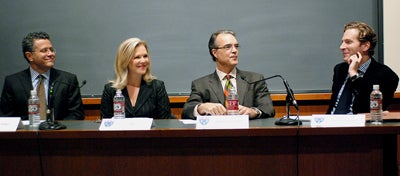Sharp wit, high energy, and laughter were tempered by serious undertones and a message for law students considering a future in journalism last week (Nov. 8) at the Harvard Law School (HLS).
The students were treated to a “celebrity panel” who talked about “Covering the Story: Lawyers in the World of Journalism” in an amusing hour-and-a-half recap of some of the nation’s flashier and tawdrier legal cases of the past 15 years — and some of their important implications.
Moderated by HLS Professor Noah Feldman, the panel included James B. Stewart ’76, Pulitzer Prize-winning writer and author of “Den of Thieves” and “Disney War”; Jeffrey Toobin ’86, New Yorker staff writer, CNN legal analyst, and author of “The Run of His Life: The People v. O.J. Simpson”; and Lis Wiehl ’87, legal analyst for Fox News and co-host of “The Radio Factor.”
The three HLS graduates were comfortable in the spotlight and forthright with their assessments of both the good and the bad sides to their profession.
Toobin, a former editor of the Harvard Law Review, captivated the crowd early with his surreal description of a courtroom full of people tapping their feet to Michael Jackson’s song “Thriller.” It was played, he said, as part of a documentary on the singer that was viewed as evidence at his 2005 trial on charges of child molestation.
“I went to Harvard Law School for this?” he said he recalled thinking at the time.
The O.J. Simpson case, members of the panel agreed, opened the floodgates in the 1990s for a surge of around-the-clock coverage of high-profile celebrity crimes, introducing a need for legal experts who could quickly translate complex legal terms into common English for the general public.
“There is an appetite for this stuff,” said Toobin. “The challenge is to invest your coverage of some of the sleazy stuff with a level of intelligence.”
The group acknowledged it benefited from the public’s 24-hour thirst for crime-driven news stories, which resulted in the explosion of legal and court TV shows and created their careers as on-air legal analysts. While they admitted many of the cases they cover were sordid in nature, the panelists were quick to point out that these cases often concern serious themes and issues.
One of the reasons for the popularity of such cases is that they include elements of the public dialogue that are important, things like race, sex, and celebrity culture, said Stewart.
Toobin agreed.
“Yes, it is true that sometimes these cases raise interesting issues,” he said. “I really enjoyed covering the Kobe Bryant case because that was a wonderful window into the [legal] issue of rape and consent and what the laws on the books say and how they are acted on in the real world.”
Feldman asked the group if they had tricks that they used in explaining nuanced legal rulings to nonlawyers.
Wiehl said she keeps in mind the bottom line, what she feels is the most important concept people should take away from the story. In addition, she said she uses the advice of an editor who told her to act as if “you are talking to your Aunt Tess over the kitchen counter.”
As someone who works more often with the written word, Stewart said he tries to dramatize legal concepts in an effort to make them more understandable.
“If you can find ways to try to dramatize these things it’s a lot of fun to do and people will really go along for the ride … then they end up really learning something.”
During the question-and-answer session, an audience member asked Toobin, author of “The Nine: Inside the Secret World of the Supreme Court,” how he broke through the wall of such an “iconic, secretive institution.” The answer, Toobin said, was to look in obvious places. “You’d be surprised at how much is hidden in plain sight.”
The CNN legal analyst said he did much of his research in West Lafayette, Ind., home of the C-SPAN archives, where he pored over tapes of panel discussions, speeches, and commencement addresses involving the various justices.
“People think that it’s some double-top-secret thing, [a] blood oath that I got from some Supreme Court justices. I just saw it on C-SPAN,” he said.
All three admitted to an early inclination toward the media world. Stewart was a cub reporter for the monthly legal magazine American Lawyer. While in college, Wiehl strapped a TV camera to her back and roamed the streets of New York City looking for stories for a college show. Toobin was born into a family of journalists.
The panelists offered practical advice to those in the crowd hoping to make the jump to the world of journalism.
Wiehl encouraged them to network and look at securing an internship in the field as a sure way to make connections and contacts. Toobin told them to simply do the “hard, difficult, unpleasant” task of writing.
“If you write,” he said, “you’re way ahead of the game.”
Transmitting wisdom from one generation to the next through effective storytelling will always find a market, added Stewart.
“The demand for that is never going to go away.”
–Colleen Walsh, Harvard News Office
